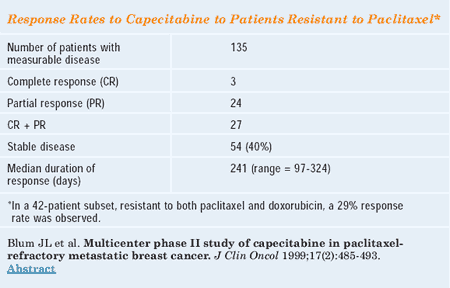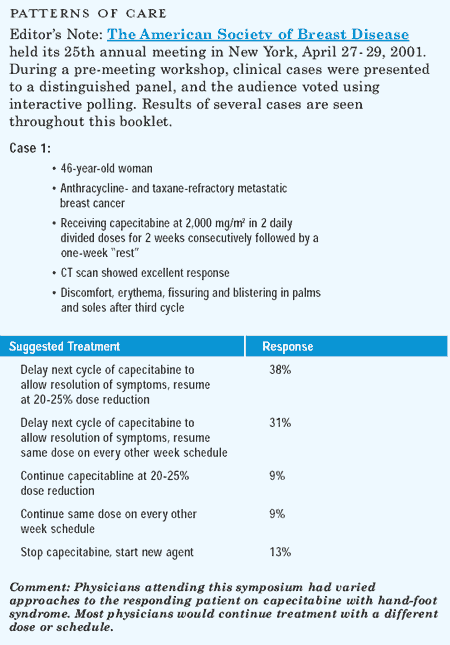| You
are here: Home: BCU 4|2001: Section 2

Section 2
Risk and Benefits of Capecitabine
in Metastatic Disease
INTEGRATION
INTO MANAGEMENT ALGORITHM
The response
rate of 20 to 30 percent that seems to be reported in multiple studies
of capecitabine includes many patients who have been heavily treated.
So for patients who’ve had anthracyclines and taxanes and possibly
even other agents, there now is an opportunity to induce a remission
with an oral drug that doesn’t cause hair loss, myelosuppression
and the threat of neutropenic fever.
Also, I believe
there’s a role in appropriate patients for capecitabine early
on — although it’s not FDA-approved for that use. We know
that none of the therapies in metastatic breast cancer will cure
patients — whether it be taxanes or anything else. They’re
all palliative therapies.
And for a woman
who has lost her hair once and now has to deal with the depression,
frustration and fear that comes with the diagnosis of recurrence,
the availability of a kinder, gentler oral drug that doesn ’t
have a myriad of symptoms is a very good option.
And so I think
it’s a reasonable thought,even in younger women. Depending
on the clinical status of the patient,capecitabine is perfectly
reasonable to use in any patient in the metastatic setting, provided
quality-of-life issues are key.
—Hyman
Muss, MD
The median duration
of response is about eight to nine months in responders to capecitabine.15
However, all of us who have used a lot of this agent have patients
whose responses lasted well over a year and even two years or more.There
is a subset of patients who do remarkably well on the right dose
of capecitabine for a long period of time.Tethering a patient to
intravenous therapy — whether weekly or every three weeks —
is certainly a step down in the quality of life.
And so I have
used single-agent capecitabine in women who are HER2 non-overexpressing
with relatively indolent, fairly small volume, asymptomatic disease
to keep quality of life as high as possible. I also have many older
patients whose first-line chemotherapy for metastatic disease was
capecitabine, because they didn’t want IV therapy, alopecia
and nausea.
—Joyce
O’Shaughnessy, MD


-
Review Select Publications
Page
2 of 2
Back
|
